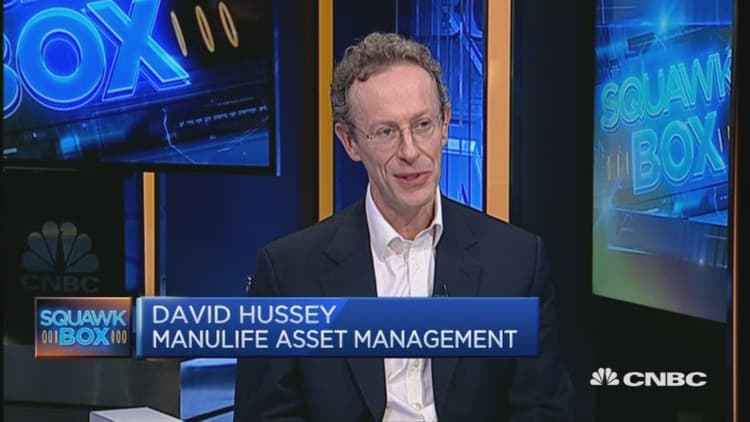
The European Central Bank (ECB) needs to do something to reflate the economy, but negative interest rates aren't it, said David Hussey, Manulife Asset Management's head of Europe, Australasia and Far East equities.
As the ECB heads into its meeting on March 10, its President Mario Draghi "needs to reassure markets that he can kick start and reflate the European economy," Hussey told CNBC's "Squawk Box," noting inflation is at multi-year lows due to weak oil and commodity prices.
But negative interest rates -- or cutting the ECB's deposit rate deeper into negative territory from the current negative 0.3 percent as many expect the central bank will do next week -- aren't the way to go, Hussey said.
"It's just a horrible policy. The worst thing it does is it sucks confidence out of the system," he said. "It's bad for banks, bad for banks' capital. It's bad for lending; it's therefore bad for the economy. So they need to have a rethink on that one."
Negative interest rates —effectively charging depositors for the privilege of parking their cash— have again risen to investors' attention after the Bank of Japan joined the ECB and the Swiss National Bank in slashing rates below zero earlier this year. With global economic prospects still weak, there has been some speculation other central banks might follow. The Bank of England's chief economist last year said negative interest rates might be needed to revive the economy.
Their efficacy is still being debated, however. While negative rates have lowered bond yields in many European countries, economic growth has failed to pick up and banks' margins have come under pressure.
Negative interest rates are driving much of Hussey's portfolio decisions.
"You look at asset markets around the world, and you look where yields are for property or bonds, they're often negative," he said. "If you're an investor, investing for yield and income, if you're retiring and you're on your pension, what are you going to do? You have to buy equities."
Manulife Financial had around $676 billion under management at the end of 2015.
The search for yield has sent him into some beaten-down sectors, such as financials, oil and mining plays.
One of the bigger bets: HSBC. That's despite the bank's full-year profit before tax for 2015 coming in at $18.8 billion, missing a Reuters forecast for $21.8 billion, with revenue rising just 1 percent on-year to $57.7 billion.
Indeed, while Hussey doesn't expect a lot of growth at HSBC, he calls stocks like it "nirvana for investors," noting the bank's 8 percent dividend yield.
"HSBC maybe isn't growing, the world isn't growing. But why is that such a bad thing? We've had 20 years of huge growth funded by debt and it's kind of left us in a bit of a mess," he said.
Follow CNBC International on Twitter and Facebook.
—By CNBC.Com's Leslie Shaffer; Follow her on Twitter @LeslieShaffer1




